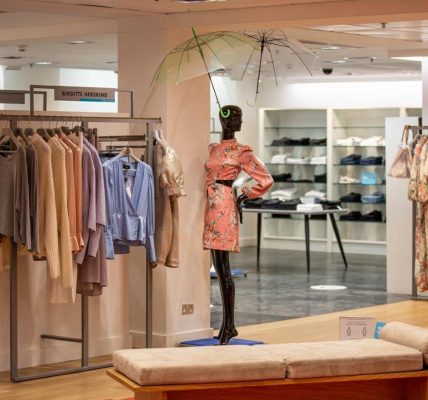Meet the US craftspeople shaping a new future in the face of Covid
Craftspeople are among those who have been hit hard by the various lockdowns but, as Lorraine Behrens reports, some have thrived in the face of adversity. Pictures by Simon Hulme and Tony Johnson.
The effects of the pandemic and lockdown have hit many people who rely on artisan events such as craft fairs, artists trails and open studios to make their living. With most craftspeople being self-employed, there has been little financial help available and now, more than ever before, they are turning to online marketplaces and other selling tools in order to continue with trading and workshops.
Kate Emma Park has transformed how she runs her glass-firing business, making homeware, giftware and jewellery. A supplier to the National Trust and independent shops, all of Kate’s trade orders and workshops were cancelled when lockdown was introduced.
“I missed out on any help so I needed to think quickly as I have three children and a mortgage to pay. I developed make-at-home kits in the first lockdown and I am still expanding the range,” says Kate, who has a glass studio called Twice Fired in Leeds.
“Before the pandemic we were due to have our best year ever. We supply the National Trust, local independent shops, galleries and we had just started supplying John Lewis through curated makers. We normally hold lots of workshops in our studio and other venues like the Barbara Hepworth gallery in Wakefield, the Craft House in Bingley and Just Makers in Ripley. We had also started to do corporate events and had provided team days for various organisations.
“I had also been approached by a Michelin star restaurant in London to design a new dinnerware service for them. We had completed a few months of prep work and were looking at placing the order. This all suddenly stopped, as it did for everyone else. I thought carefully about how I could keep going. A few of my regular workshop ladies asked if I could put them together in a takeaway box so they could do some glass at home, so I set up a collection box at our gate so we could do Covid-safe collection and drop-offs.”
These were for local people initially and were collected on their daily walk, or trip to the supermarket.
“When I realised this situation was not going to improve for a while, I started to think about how I could turn the collection kits into postable kits, the difficulty being, once you have made the kit you need to return it to be fired in our kilns. I made up several test kits and posted them to friends and family and with a bit of tweaking developed a product I was happy with and launched them on our website. They were instantly popular so I continued to add more designs, I then also opened an Etsy shop and sales took off.”
Kate has three children, aged 11, 13, and 15. “It has meant that my mornings are spent facilitating family things and not working in the studio, pushing my working day later. I also suffer from the classic ‘mum guilt’ of wanting to spend time with the children, take an interest in their school work and provide fun activities, versus working and paying the mortgage.”
Over in Skipton, Jaki Bogg runs HotButterYarns, where she dyes yarn, designs knitwear and sells both garment and accessory kits and yarn. She also delivers small workshops in machine embroidery, slow stitching, textile sculpting, knitting and crochet.
“I had been building up my business for the past five to six years, and doing quite well: selling at yarn festivals up and down the country, teaching, guild and WI talks, all of which have now been postponed or cancelled for over a year,” says Jaki.
“At first it was all a bit unreal, but then it became very real. It became impossible to plan anything, everything that had been booked the previous year became unbooked with no notion of if or when it would happen again. It dawned very quickly that sales would dry up and the business would fall into a kind of senescence, with the only hope that it would not last forever, yet here we are, a year later, still unable to plan.
“I realised my normal way of selling, which is directly to the public, was not about to happen again in a hurry so I’ve turned to online selling, which I’m not great at – I love selling face to face. However, Instagram has been a place where I’ve been selling and that ticks over reasonably well. I’ve also been making short films for fun.”
Jessica Grady is an embroidery and mixed media artist who works with hand embroidery and recycled materials. “Lockdown and cancellation of events has meant I have had to completely reinvent my business with doing online workshops. I also ran my first education event for schools, colleges and universities across the UK for students to give them some inspiration in lockdown – it was attended by more than 150 different schools,” she says.
“I have been doing lots of work with organisations in running online workshops with a focus on digital well-being and responding to mental health issues that many people may be suffering due to the pandemic and stress. Embroidery is very relaxing and a proven de-stresser, so this has been great, too.”
Brian Nelson runs Encaustic Art Plus from his studio gallery at the Elsecar Heritage Centre, giving talks and demonstrations to community groups. He has lost a large part of his craft business owing to the pandemic and is now working on building a YouTube channel to support people wanting to learn the skill of painting using coloured beeswax.
“As a result of the lockdown I have been unable to teach face to face, community groups have been unable to meet and art and craft shows have all been cancelled. Whilst shielding due to my disability and health issues, I used my Facebook page to sell materials to keep going, then a friend of mine came on board and we started making videos. We update a new video every Wednesday showing people skills in encaustic art,” says Brian.
“I would like to think that I will be able to run my classes and demonstrations again in the next year or so but sadly only time will tell. I intend to keep going with the YouTube tutorials with the hope of one day being able to make a little bit of money from that.”
Kylie Henshaw has been teaching paper craft workshops across West US for eight years and started taking her classes online last March. “I send out kits of materials and we meet on Zoom to create our projects together. I have been able to keep my classes going virtually, to keep my customers crafting throughout lockdown, and this has provided a place to gather socially in a time when it has been especially important to stay connected. I also overcame my fear of Facebook and YouTube videos and I now have video tutorials, tips and live craft-alongs which has even resulted in my business growing during the last year.
“I have also been able to provide craft sessions for groups such as WIs and I’ve organised charity craft events online to raise money for Candlelighters, Marie Curie and Manorlands Hospice. I am planning a virtual craft event for the mental health charity Mind in April as part of their 2.6 campaign, which will be 26 crafts in a weekend.
“So adapting my business has been a steep learning curve but there’s so much more I think I can do, and I’m excited by the challenge – because I genuinely feel like crafting now more than ever is one thing that can positively impact on someone’s mental well-being, and being in a position to provide this service is such a privilege.”
Get in contact
Kate Emma Park, www.twicefired.co.uk, www.etsy.com/shop/twicefiredglass
Brian Nelson, Encaustic Art Plus, www.encausticartplus.co.ukHotButterYarns, jakibogg.artweb.comJessica Grady, contemporary mixed media embroidery artist, workshop tutor and speaker, www.jessicagrady.co.uk, Instagram: @jessica_rosestitch Facebook: @jessicagradyembroideryartist
Kylie Henshaw, www.hellocrafter.co.uk, Instagram: @hellocrafter










